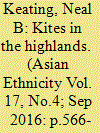| Srl | Item |
| 1 |
ID:
145854


|
|
|
|
|
| Summary/Abstract |
Bunong people from both sides of the Cambodia–Vietnam border are increasingly self-identifying as Indigenous peoples and claiming collective human rights as Indigenous peoples at international platforms, such as the United Nations Permanent Forum on Indigenous Issues. As of now the Bunong from Vietnam articulate Indigeneity from a diasporic distance, having fled the country as political refugees. The aim of this article is to compare and contrast the networks of Bunong Indigeneity that now seek cross-border and transnational connections, and examine the blockages and openings that appear as a result. The border between Vietnam and Cambodia separates Bunong communities and families spatially, politically, and culturally. Cambodia recognizes Indigenous peoples, while Vietnam does not. Through primary research with Bunong activists, combined with secondary sources, this article adopts a comparative cross-border approach to the Bunong articulation of Indigeneity, and asks where this movement may be headed.
|
|
|
|
|
|
|
|
|
|
|
|
|
|
|
|
| 2 |
ID:
127100


|
|
|
|
|
| Publication |
2013.
|
| Summary/Abstract |
Based primarily on fieldwork with Kuy peoples in Rovieng District, Preah Vihear Province, this article examines contemporary Indigeneity in Cambodia as an emergent heterogeneous and polythetic identity vis-à-vis the changing nature of the state, and suggests that a more substantive political engagement with Indigenous identity and history offers a pluricultural reframing of the world heritage of Cambodia and a possible source of alternative land regimes that are more sustainable and equitable than the current dominant neoliberal model of land concessions. Although the 2001 Cambodian National Land Law holds critical significance for Indigenous Peoples in pursuit of communal land rights, it has largely failed to protect rights because of (i) persistent discrimination against groups now claiming Indigenous identities, embedded in state procedures of Indigenous identity and land registration; and (ii) the state's demonstrated embrace of land concession regimes as the preferred strategy of economic development. The Delcom mining concession of Kuy lands provides one example of the destructive impacts of this strategy. An examination of the evidence of Kuy peoples' history suggests that their classification as ethnic minorities is of recent origins, and that in the past they played more active roles in Cambodian state-building projects.
|
|
|
|
|
|
|
|
|
|
|
|
|
|
|
|